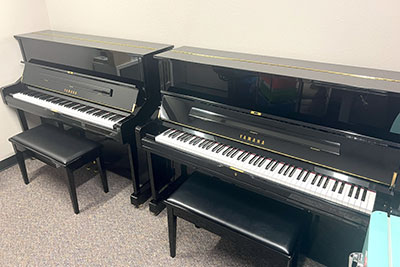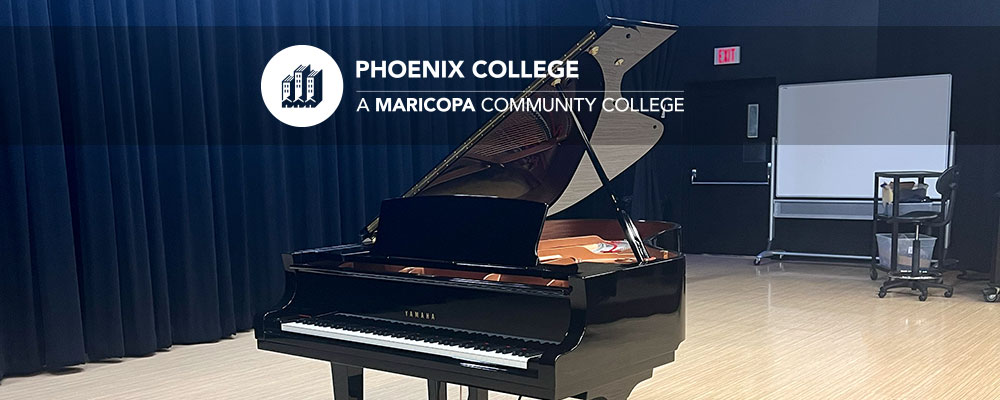 Ever since he began teaching at Phoenix College over 21 years ago, Dr. Karl Schindler, has been thinking about replacing the college’s piano inventory with institution-grade equipment. As Chair of the College’s Visual and Performing Arts Department, he knew that this would help reduce his department’s operating costs and attract more students to his program. As a composer, he had always been a fan of Yamaha pianos and was eager to work with both their acoustic and technology-infused equipment. Unfortunately, Dr. Schindler’s predecessor had purchased several Petrof Pianos just before passing the torch. While they were nice home pianos, the Petrofs were not well suited to the daily rigors endemic to a university music school. So, as Dr. Schindler worked with these deteriorating instruments, he noticed an increase in his service costs corresponding to increased problems with the pianos themselves – a common problem when universities use “home pianos” in an institutional setting. Eventually, Dr. Schindler began a detailed and arduous process to find funding for new institution-grade Yamaha pianos at Phoenix College.
Ever since he began teaching at Phoenix College over 21 years ago, Dr. Karl Schindler, has been thinking about replacing the college’s piano inventory with institution-grade equipment. As Chair of the College’s Visual and Performing Arts Department, he knew that this would help reduce his department’s operating costs and attract more students to his program. As a composer, he had always been a fan of Yamaha pianos and was eager to work with both their acoustic and technology-infused equipment. Unfortunately, Dr. Schindler’s predecessor had purchased several Petrof Pianos just before passing the torch. While they were nice home pianos, the Petrofs were not well suited to the daily rigors endemic to a university music school. So, as Dr. Schindler worked with these deteriorating instruments, he noticed an increase in his service costs corresponding to increased problems with the pianos themselves – a common problem when universities use “home pianos” in an institutional setting. Eventually, Dr. Schindler began a detailed and arduous process to find funding for new institution-grade Yamaha pianos at Phoenix College.
During the process, Dr. Schindler pointed out that two pianos – a pair of 1980s Yamaha uprights – had held up better than the 21-year-old-Petrofs. Armed with this knowledge, he met with the college’s music faculty and begin laying the groundwork for a piano replacement plan.
Partnering with Phoenix College
As a 25+ year veteran of the Institutional Piano Sales industry, I’ve pretty much seen it all. I know which pianos are built ruggedly enough to survive harsh university (or worship) environments and which pianos – though attractive home options – will cost a school or church more to maintain over time. All pianos have a lifespan – just like cars or even human beings! …and just like cars (or people), they require regular maintenance and “good DNA” to survive in more difficult environments. Pianos with higher quality manufacturing processes, better grade materials, and better designs, will last longer and require less maintenance than their cheaper (and less rugged) competition. So – when Dr. Schindler approached me about replacing 19 of the schools Petrof pianos with new Yamahas – I was happy to help him find the perfect inventory mix to best meet his school’s piano needs.
Selecting School Pianos
 Based on intended use, the solution for most of the school’s pianos was obvious. The 48” Yamaha U1 upright piano has made a global name for itself as a “smart choice” for schools, churches and even homeowners. Today, the Yamaha U1 is the number one selling upright piano in the world because of its excellent performance, rugged design, and high quality components. Especially since Phoenix College had already experienced the U1’s value (with those 1980’s Yamaha U1s), it was an easy decision to designate the Yamaha U1 as the solution for most classrooms, teaching studios and even some practice rooms.
Based on intended use, the solution for most of the school’s pianos was obvious. The 48” Yamaha U1 upright piano has made a global name for itself as a “smart choice” for schools, churches and even homeowners. Today, the Yamaha U1 is the number one selling upright piano in the world because of its excellent performance, rugged design, and high quality components. Especially since Phoenix College had already experienced the U1’s value (with those 1980’s Yamaha U1s), it was an easy decision to designate the Yamaha U1 as the solution for most classrooms, teaching studios and even some practice rooms.
One space – a state-of-the-art audio production recording studio – needed something bigger, however. Unfortunately, a baby grand piano would take up too much space, but the Yamaha U3 – a 52” behemoth – was an ideal compromise. We selected a Yamaha U3 for that space.
Of course, a proper recital space requires a grand piano and I had just the thing! A rich and warm – yet powerful – piano for smaller performance spaces, the 7’ Yamaha C6X grand piano satisfies and delights performers of all skill levels, so it was the perfect choice for one of Phoenix College’s performance spaces, the Janet Sessions Recital Hall. It would also complement the Yamaha baby grand piano Phoenix College purchased from me the previous year for an even smaller performance space.
 Finally, my team and I decided to recommend a technology-infused piano for Dr. Schindler’s office, the Theater Program’s rehearsal space and a teaching studio or two. These hybrid pianos offer an acoustic piano action (with all the same components), but digital sound sources. This gives players the feel of a wood-and-strings piano, as well as some of the most popular digital features available – like headphones, Bluetooth connectivity, recording and no tuning requirements. Phoenix College selected four Yamaha Hybrid pianos (Model NU1XA) to round out their inventory upgrades.
Finally, my team and I decided to recommend a technology-infused piano for Dr. Schindler’s office, the Theater Program’s rehearsal space and a teaching studio or two. These hybrid pianos offer an acoustic piano action (with all the same components), but digital sound sources. This gives players the feel of a wood-and-strings piano, as well as some of the most popular digital features available – like headphones, Bluetooth connectivity, recording and no tuning requirements. Phoenix College selected four Yamaha Hybrid pianos (Model NU1XA) to round out their inventory upgrades.
New Yamaha Pianos
 My colleague, James Harding, and I initially met with Dr. Schindler and Dr. Jessica Yam, Phoenix College’s Piano Professor, to discuss their department’s needs and develop a piano replacement strategy in Summer of 2024. My team and I returned several weeks later to evaluate their existing pianos. Then, we submitted a few proposals until we all agreed on the perfect inventory mix. All-in-all, the process took about 13 months from our first meeting until we were able to deliver the pianos, but the results were magnificent.
My colleague, James Harding, and I initially met with Dr. Schindler and Dr. Jessica Yam, Phoenix College’s Piano Professor, to discuss their department’s needs and develop a piano replacement strategy in Summer of 2024. My team and I returned several weeks later to evaluate their existing pianos. Then, we submitted a few proposals until we all agreed on the perfect inventory mix. All-in-all, the process took about 13 months from our first meeting until we were able to deliver the pianos, but the results were magnificent.
The new pianos are now in place and experience heavy use. The faculty are thrilled and Dr. Schindler has finally achieved his piano vision.
We, at Riverton Piano Company, are delighted and honored to partner with Phoenix College in their school piano replacement project. We offer them our heartiest congratulations for their vision, tenacity and passion for quality, and we look forward to seeing what their faculty and students accomplish with the new equipment!





